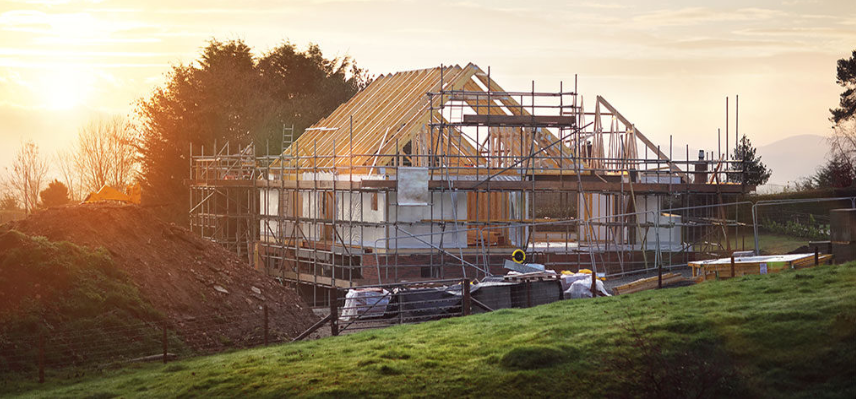Building a home doesn’t have to be a gruelling process. Here are our top 10 tips for a pain-free home construction process.
1. Get your plan in place
Planning is the most important part of the construction process.
Make sure you meticulously plan the details of your house. What direction will it face on the lot? What will the layout and flow of the rooms be? What kind of lighting will you use, and how many power points will you install (tip: you always need more than you think)?
There are several useful tools for planning out the design of your home. Sites like Floorplanner and RoomSketcher let you create mock floorplans. When in doubt, good old graph paper will work as well.
You’ll also want to start keeping track of design ideas that inspire you, and that you’d like to emulate. Think about starting a Pinterest board for each room of your house to file examples of your favourite designs. As well as helping you plan, they’ll be a great point of reference to show your builders once construction is underway.
2. Budget more than you expect
No matter how much you think the building process is likely to cost, it’s likely to cost more. There could be any number of items that aren’t included in the estimate your builder gives you. For instance, your builder is unlikely to include costs such as electrical and gas metres, NBN hookups or window coverings. Items such as landscaping and outdoor concreting, fences and gates, decking and letterboxes might also not be included on the estimate. These are known as finishing costs and could run anywhere from 15-25% of your budget. You’ll also need to consider site costs, which are the costs associated with preparing your site for construction, and you may also have to pay for planning application fees.
In addition to add-ons you might not have considered, you need to budget for unforeseen circumstances. For instance, you might want the luxury of changing your mind should any of the fittings or materials not match your expectations. You can use the table below to work out a rough budget.
Item Cost
Land price $_
Stamp duty $_
Loan settlement costs $_
Site cost $_
Planning fees $_
Finishing costs (15-25% of budget) $_
Build cost $_
Total $_
3. Pick the right builder
This might be one of the most important decisions you make in the home building process. Whichever builder you choose, you’re going to be working with them for many, many months. It’s important to get the choice right at the outset to head off problems down the road.
There are several factors you should consider when choosing a builder:
Credentials
Make sure your builder is adequately licensed and insured. You’ll also want to make sure the builder is a member of Master Builders or the Housing Industry Association (HIA). If you are looking for a loan for the construction, banks will want to know a lot more about the builder.
References
Check into the builder’s past work. Were previous customers satisfied? Don’t be afraid to ask the builder for references before you sign a contract. Also, check with the Department of Fair Trading to ensure there are no complaints against the builder you choose. Also, check up on the warranty and service they offer.
Past work
Have a close look at some of the houses the builder has constructed in the past. Make sure the level of quality is high. Also, investigate resale data on some of the houses the builder has previously constructed.
Style
In looking into the builder’s past work, see that it suits your design style. A builder might be very accomplished at constructing a style of home, but if what you want is outside their area of expertise you might be wise to look elsewhere.
Personality
As mentioned above, you’ll be working with your builder for several months. Make sure you’re comfortable with them. Also, make sure they communicate well. If a builder doesn’t communicate well with you, it’s likely they don’t communicate well with their contractors either.
Price
All of this is a moot point if a builder is outside your budget.
4. Understand your agreement
Carefully read through the contract with your builder to make sure you understand its contents. Make sure you’re not taken by surprise by what the construction costs cover and what they don’t cover.
Make sure includes a cooling off period, and that it specifies a timeframe for construction that suits your needs. Check to see that it includes detailed plans, warranty and insurance information. Also pay close attention to the payment schedule.
Finally, it’s wise to have a solicitor look over the contract before you sign. Cross out any blank spaces, and make sure any variations to the contract are well documented and mutually agreed upon.
- Know what you’re entitled to
If you’re building your first home, you could be entitled to a First Home Owner Grant (FHOG), dependent on the state or territory in which you live. This could substantially offset the cost of your home. To find out if you might be eligible, check the website of the First Home Owner Grant website for your state.
Likewise, depending on your state or territory, you might be eligible for stamp duty concessions on the purchase of your building lot.
- Get your financing in order
When you’re building a property, you’ll need a construction home loan to finance the process. A construction home loan is structured differently than a regular home loan in that the lender won’t release all the funds at once. Instead, the lender will decide how much you need for the project and will then release the funds in periodic payments to your builder. These periodic payments are known as ‘progress draws’. They’ll be paid out at the completion of each individual stage of your construction.
Another way construction loans can differ is in the size of deposit lenders require. Because construction loans can be seen as inherently riskier, lenders might require at least a 20% deposit.
Before you seek out finance, make sure you have a detailed plan in place. Because construction home loans rely on an estimate of the assumed value of the completed house, your lender will want to have detailed construction plans that are fully costed.
Ensure that you have property insurance at the correct stage.
- Communicate constantly
Throughout the process, communicate often with your builder and tradesmen. Get regular updates on the progress of construction and check in yourself. It’s a good idea to take pictures of the progress on a regular basis so you can document any problem areas.
With good communication, though, you should be able to avoid arguments during the building process. If you’ve clearly laid out what you want and the details that you see as non-negotiable, construction will run much smoother.
- Look for ways to save
Building a home is going to be an expensive process, and as we mentioned above, it’s likely you’ll end up paying more than you anticipated. There are ways you can save money. Shop around for the best prices on fittings and fixtures, and on the materials your builder will use. Get multiple quotes for any item needed during the construction process.
You can also save money at the outset of the process by choosing a site that takes less preparation. Hauling off dirt, removing rocks or clearing brush can end up being costly. Picking a lot that needs little preparation before construction commences can minimise these costs.
- Get an independent inspector
Each stage of your construction should be inspected by an independent consultant. This will help you rest easy knowing that all the building materials and practices used in constructing your home meet all the necessary codes and regulations. If you get a construction loan, bank valuer will also inspect the property to protect the bank’s interest.
- Know your rights if something goes wrong
If you’ve planned your building process well, budgeted well and signed on with the right builder and lender, it’s unlikely you’re going to face any insurmountable problems. If the worst should happen, though, there are a number of channels you can go through for complaints against builders.
If your builder is a member of the Housing Industry Association or Master Builders, each of these organisations have processes for handling complaints. Each state and territory also have its own process for handling building complaints.
Feel free to contact us via
info@FinanceCircleGroup.com.au
The information on this website is general information only and is not intended to be a recommendation. We strongly recommend you seek advice from your financial adviser as to whether this information is appropriate to your needs, financial situation and investment objectives.


